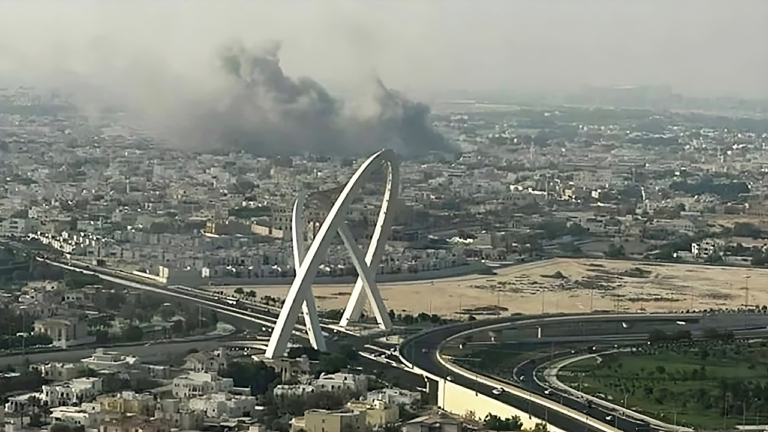
On the morning of September 9, 2025, 15 Israeli jets carried out an airstrike on residential buildings in Doha, Qatar. Israel claimed that the strike was a precisely targeted attack on Hamas political leaders, who had been meeting to discuss the latest ceasefire deal proposed by the United States as part of ongoing efforts to end the war in Gaza. Hamas said that its leadership escaped the attack unharmed, though six people were killed—including the son of senior Hamas leader Khalil al-Hayya and one member of Qatar’s Interior Security Forces.
Earlier reports suggested that Israel gave advance warning of its strikes to the US, but a recent report indicates otherwise. Israeli Prime Minister Benjamin Netanyahu said that the strike was a “wholly independent” operation: “Israel initiated it, Israel conducted it, and Israel takes full responsibility.” Qatar condemned the bombing as a “flagrant violation of international law” and suspended its participation in the ceasefire negotiations between Hamas and Israel. The attack was widely condemned by many governments across the Middle East, including Saudi Arabia, Egypt, and Jordan.
Israel’s unprecedented airstrike on Qatar—a major US non-NATO ally that hosts some 11,000 US military personnel—is a significant escalation of its military operations, with the potential to further destabilize the Middle East.
Arab Center Washington DC asked its analysts to provide their perspectives on the repercussions of Israel’s attack for Gaza and the wider region.
A Rogue State: Israel’s Strikes on Qatar and Regional Escalation
Yousef Munayyer, Head of the Palestine/Israel Program and Senior Fellow
The strike on Doha this morning is the latest in a series of bombings that illustrate Israel’s increasingly brazen behavior as a rogue state. Qatar joins a growing list of countries— including Palestine, Iran, Lebanon, Syria, Tunisia, and Yemen—which Israel has targeted with military strikes in blatant disregard of national sovereignty and international law. The Doha strike fits a well established pattern of Israel breaking taboo after taboo, relentlessly pushing the boundaries of violence and destruction to normalize its policy of perpetual warfare. Israel’s failure to resolve the grievances of Palestinians has mushroomed into a policy of constant destabilization and destruction that reaches far beyond tiny, besieged Gaza, currently suffering genocidal assault and occupation by the Israeli armed forces. Israel’s failure in Palestine has deadly consequences for the people of the entire region.
A key ally of Washington that hosts the largest US airbase, al-Udeid, in the Middle East, in May 2025 Qatar also welcomed a visit from President Donald Trump himself. None of this deterred the Israeli strike. As a rogue state, Israel is willing to cross any red line and break any international law. For governments in Amman, Cairo, Riyadh, and Ankara, Israel’s strike against a US ally this morning should sound major alarms. Currently led by an indicted war criminal, Benjamin Netanyahu, and governed by a coalition government hell-bent on expansionism and ethnic cleansing, Israel shows no signs of stopping its ever-expanding war on the region—and on the very notion of peace and stability.
When Mediation is the Target: Israel’s War on Diplomacy
Hanna Alshaikh, Palestine Project Coordinator
The stated objective of Israel’s attack on Qatar today was the assassination of Hamas’s ceasefire negotiation team, but the unspoken objective was the annihilation of diplomacy itself. In immediately claiming responsibility for what it called “Operation Summit of Fire,” Israel was more forthcoming than ever about its aim of regional hegemony. Speaker of the Knesset Amir Ohana shared a video of the strike, saying, “This is a message to the entire Middle East.” To be precise, the message is that no world power—not even the United States—can make Israel de-escalate.
Israel has pursued tactics such as weaponizing peace talks and using warfare to sabotage negotiations long before today’s attempt on the lives of Hamas negotiators in Doha, or even its assassination of Hamas Political Bureau chief Ismail Haniyeh in Tehran in 2024. In 2008, Israel cynically used a truce with Hamas to prepare for its 2008-09 war on Gaza. In 2012, Israel launched another war on Gaza after assassinating Ahmad al-Jabari, who had led negotiations the previous year that resulted in the exchange of Israeli soldier Gilad Shalit for 1,000 Palestinian prisoners. In 2014, two months after Palestinian Authority President Mahmoud Abbas announced a National Unity Government as a result of Hamas-Fatah national reconciliation talks, Israel launched a brutal 51-day war on Gaza to thwart the national unity government and divide Palestinian politics, thereby sidestepping international pressure to negotiate with a unified Palestinian front.
Israel’s strategy is clear: to make it as exhausting and costly as possible for the international community to pressure it into negotiating a ceasefire or committing to a long-term peace process.
While Israel’s previous strikes across the region met only limited criticism, this attack on a major non-NATO US ally is different. Qatar is recognized for its leadership in international conflict resolution. The strike is an urgent reminder to take Israel’s provocations seriously—and to recognize that Israel has utter contempt for international cooperation, peacemaking, and diplomacy.
US-Israel Collusion? The Doha Strike and Trump’s Foreign Policy
Charles W. Dunne, Non-resident Fellow
Israel has claimed that its attack in Doha “was a wholly independent Israeli operation,” as Prime Minister Benjamin Netanyahu’s office put it. Although this statement may be true, nobody in Qatar or other Gulf Arab States—or in fact anywhere—believes it. The Jerusalem Post reported that Israeli officials confirmed off-the-record that the United States knew about the attack in advance and gave Israel the green light. Unnamed US officials reportedly confirmed this account to CNN. Trump himself issued a “last warning” for Hamas to accept a ceasefire deal two days before the attack. The White House issued only mild criticism of the attack on Tuesday afternoon, noting Trump “feels very bad” about the strike on Qatar.
Although Trump’s foreign policy is erratic and deliberately unpredictable, a pattern seems to be emerging. The Israeli strike on Iranian nuclear facilities in June 2025, with US support, came suddenly while the administration claimed it was pursuing negotiations with Tehran. Israel launched its Doha attack just as Hamas negotiators were sitting down to consider the latest ceasefire proposal conveyed through intermediaries by Trump envoy Steve Witkoff. In both cases, Washington’s diplomacy ended when Israel took action. These events give the impression of deliberate collusion between the United States and Israel. Perhaps Trump’s love of quick wins and tough-guy politics won out. Despite his occasional harsh words for Netanyahu, Trump admires his simple solutions for complicated problems and is happy to go along with the Israeli prime minister’s plans. Any broader strategic vision takes a back seat.
President Trump seems to believe that it is possible to manage or ignore potential complications such as relations with Qatar, which houses the largest US base in the Middle East; the fate of the hostages remaining in Gaza; Washington’s increasing reputation as a highly untrustworthy actor; and perhaps even the loss of that Qatari “gift” of a Boeing 747 that Trump plans to put into service as his new Air Force One.
Trump’s highly personalized approach to foreign policy is ascendant, making US-Israel relations more of a two-man show and less of a complex strategic affair. Where we go from here is anybody’s guess. And that is just the way Trump likes it.
Doha in the Crosshairs: What Israel’s Airstrike Means for the Gulf
Kristian Coates Ulrichsen, Non-resident Fellow
In little more than two months, Qatar has come under attack twice—first from Iran, on June 23, 2025, and on September 9 from Israel. Doha has paid a high price for its role of mediator-in-chief as it has sought to de-escalate conflicts in the region since October 7, 2023, through diplomacy. Leaders in Qatar and other Gulf states have tried to prevent the war in Gaza escalating into a regionwide conflagration that would put them all at risk.
The sense of frustration and anger in Doha will be magnified by the fact that Qatar has hosted the political bureau of the Hamas leadership since 2012 at the request of US officials—just as Qatar provided financial and humanitarian assistance to Gaza until 2023 at the request of Israel. Prior to October 7, 2023, both the United States and Israel saw utility in having Doha serve as interlocutor, aid donor, and—in the 23 months since the Hamas attacks on Israel—mediation facilitator along with Cairo and Washington.
Far from acting as a regional maverick, as Qatar’s critics allege, the partnership between Qatar and the United States has deepened considerably since the first Trump administration. Their constructive relationship was formally recognized by the Biden administration, which designated Qatar a Major Non-NATO Ally in 2022. Since 2003 Qatar has hosted the most important US airbase in the Middle East, al-Udeid. If reports that Israeli fighter jets conducted the attack are accurate, officials in Doha and across the Gulf will urgently be assessing the implications of an airstrike by jets likely manufactured by the United States in the vicinity of an airbase supposed to deter and detect aerial threats. Israel’s strikes thus have implications for security and defense ties between the US and Gulf states more generally. The likely repercussions far exceed those of the Iranian attack on Qatar in June, considering that today’s attack was carried out by the closest ally of the United States, not an adversary. Israel’s airstrike on Qatar may very well be treated as if it were an attack on the Gulf states collectively.
The Crisis of Arab Regional Security
Khalil E. Jahshan, Executive Director
Israel’s airstrike targeting the political leadership of Hamas in Doha is an ill-conceived and shocking act of aggression regardless of the supposed rationale or its immediate effect. The attack has serious political and security implications for the State of Qatar and for the rest of the Arab region.
First, the attack is a grave violation of the sovereignty and territorial integrity of Qatar, a Major Non-NATO Ally of the United States since January 2022 and home to al-Udeid Air Base, the largest American military base in the strategic Middle East region. Furthermore, Qatar is the most active and visible partner with Washington in the on-again, off-again ceasefire talks that seek to end nearly two years of bloody conflict in Gaza.
The attack is significant because it reportedly happened with the knowledge and tacit support of the US administration, which renders US denials—and even defense agreements with Washington—quite meaningless from an Arab perspective. If indeed the Israeli attack was “counter to US interests,” as the White House claimed, then why did President Trump allow Netanyahu to proceed? Why didn’t US air defenses at al-Udeid defend Doha’s skies—or at the very least alert our Major Non-NATO Ally about the impending attack? It behooves Arab governments to reassess their relations with an administration in which they have invested trillions of dollars.
Second, despite all the verbal condemnations issued by Arab countries including Saudi Arabia, the United Arab Emirates, Kuwait, Egypt, Jordan, and Lebanon, the airstrikes raise serious, challenging questions about other governments’ roles in this aggression against a fellow Arab country. Logistically, Israeli fighters involved in the attack could not have reached their targets in Qatar without using or violating the airspace of at least one or more Arab countries. Were these countries aware of the Israeli attack? Why did their multi-billion-dollar air defense system fail to detect the Israeli bombers? These questions are gravely consequential given the political impotence of Arab states to end Israel’s deliberate starvation of civilians and its genocidal war in Gaza.
Why Strike Now?
Tamara Kharroub, Deputy Executive Director & Senior Fellow
The timing of Israel’s attack on Hamas political leaders in Doha—carried out as they were meeting to consider the latest US-proposed ceasefire deal—is significant. This unprecedented strike on Qatari soil, targeting residential areas in the capital, appears to follow Israel’s pattern of disrupting ceasefire and hostage-release negotiations by attacking Hamas’s negotiating team amid talks, thereby sabotaging diplomatic and mediation efforts. It also coincides with Israel’s plans for a ground invasion of Gaza City, where destruction paves the way for Palestinian expulsion despite widespread international condemnation. The attack on Qatar thus serves as a diversion from this escalating aggression on the ground.
Israel’s actions confirm its complete disregard for international law and further escalate its unchecked belligerence against sovereign states across the region, with no regard to red lines. Netanyahu has clearly been emboldened by unwavering US support and by Israel’s apparent impunity for its actions in Gaza. With the Trump administration having failed to rein in Israeli aggression, the key question now is whether the international community will finally use its diplomatic and legal leverage to hold Israel accountable for its crimes against Palestinians and the region.
The views expressed in this publication are the authors’ own and do not necessarily reflect the position of Arab Center Washington DC, its staff, or its Board of Directors.
Featured image credit: Screencap/X






